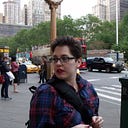March 8, 2020
Happy Women’s History Month! Today’s book rec is Assata by Assata Shakur. I went into this book knowing basically nothing about Shakur and it was a fascinating read. It starts with her being arrested after a deadly confrontation with a New Jersey state highway patrolman and being chained to the hospital bed while doctors and cops try to treat her and interrogate her, respectively. From there it skips back and forth between her childhood and formative experiences in Queens and the South and her legal battles following her arrest and indictments. She describes the horrific treatment she received as a prisoner and the heavily biased court proceedings against her. Because of the non-chronological nature of the narrative, I spent a lot of time wondering what exactly she did that landed her on the FBI’s Most Wanted list and eventually we learn that after a frustrating stint in the Black Panther Party, she had been living underground for quite some time as like, a dozen law enforcement agencies searched for her on suspicion of murder and bank robbery, mostly. She’s vague about her time between leaving the Party and her arrest, but does say she came to the conclusion that armed struggle would be a necessary component of the Black revolutionary movement, along with education, community engagement, and political activism. Come to find out she joined the Black Liberation Army, which apparently robbed banks and other businesses to help fund their organization. (This bit was not in the book, btw.) It reminds me of Mandela’s autobiography, where he is similarly quiet about particulars to avoid incriminating other members of his organization. After she’s convicted for the murder of the policeman, she spends a long time in jail and eventually escapes, which is again left intentionally vague. (This part reminds me of Frederick Douglass’s autobiography, who also kept the means of his escape secret so as not to bring down law enforcement on his rescuers.) Shakur is still alive and living in exile in Cuba, thirty five years or so after this memoir was published. The book is very compelling and very well structured as a narrative. (She includes poetry she’d written as well and unfortunately she is not a very good poet.) The coming of age stuff and her awakening as a Black woman is especially interesting. She embraced everything she learned about African cultures while rejecting the white supremacist propaganda that was/is pervasive in this country. Her viewpoints about the power structures in America (she calls it amerika) under capitalism, misogyny, and imperialism are, as far as I know, still considered gospel for revolutionaries. Honestly, reading about militants, extremists, radicals, whatever you want to call them, makes me nervous. People who are hardcore enough to dedicate their lives to working towards political goals even if it means going to prison intimidate me with their intensity even as I admire their commitment. I suppose I perceive them as close-minded and shrink away from their disapproval when I’m not as committed to their cause as they are or when I disagree with them. I’m not sure. Still working out my emotional responses to this book. It’s definitely worth sitting with the discomfort this book provokes, though. I tend to go for histories rather than memoirs so I can have more context, and I’ll definitely be reading more about her, the Black Panthers, the Black Liberation Army, and especially her trials because the legal process sounds like a MESS. I’m excited to fill in some blind spots in my historical knowledge that this book illuminated.
